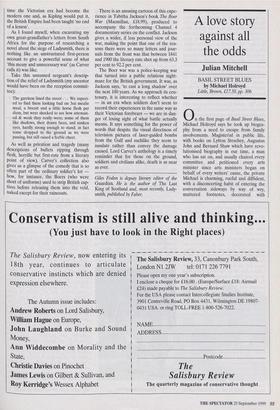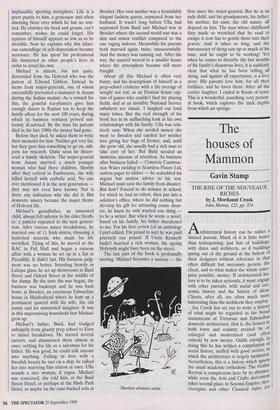A love story against all the odds
Julian Mitchell
BASIL STREET BLUES by Michael Holroyd Little, Brown, £17.50, pp. 306 On the first page of Basil Street Blues, Michael Holroyd says he took up biogra- phy from a need to escape from family involvements. Magisterial in public life, with books on Lytton Strachey, Augustus John and Bernard Shaw which have revo- lutionised biography in our time, a man who has sat on, and usually chaired every committee and petitioned every arts minister since arts ministers began on behalf of every writers' cause, the private Michael is charming, rueful and diffident, with a disconcerting habit of entering the conversation sideways by way of wry, muttered footnotes, decorated with implausible sporting metaphors. Life is a great puzzle to him, a grotesque and often alarming farce over which he has no con- trol. He clutches his head and groans, can't remember, wishes he could forget. His opinion of himself appears so low as to be invisible. Now he explains why this hilari- ous camouflage of self-deprecation became necessary. He has spent his professional life immersed in other people's lives in order to avoid his own.
Michael is almost, but not quite, descended from the Holroyd who was the patron of Edward Gibbon. Instead he stems from major-generals, one of whom successfully prevented a massacre in Assam during the Indian mutiny. As a reward for this, the grateful tea-planters gave him enough shares in Rajmai tea to keep the family afloat for the next 100 years, during which its business ventures proved uni- formly ill-advised. By the time his parents died in the late 1980s the money had gone.
Before they died, he asked them to write their memoirs for him. Neither got very far, but they gave him something to go on, sub- jects for research. Quite soon he discov- ered a family skeleton. The major-general from Assam married a much younger woman who had three children. Shortly after they retired to Eastbourne, the wife killed herself with carbolic acid. No one ever mentioned it in the next generation they may not even have known. Nor is there any indication why she did it. But domestic misery became the major theme of Holroyd life.
Michael's grandfather, an unwanted child, always felt inferior to his elder broth- er, a pattern repeated in the next genera- tion. After various minor breakdowns, he married one of 11 Irish sisters, choosing a hysterical neurotic who made his life wretched. Tiring of this, he moved to the RAC in Pall Mall and began a ruinous affair with a woman he set up in a flat in Piccadilly. It didn't last. His business judg- ment was no better. Investing heavily in Lalique glass, he set up showrooms in Basil Street and Oxford Street in the middle of the slump. By the time the war began, the business was bankrupt and he was back home at Brocket, an enormous Edwardian house in Maidenhead where he kept up a permanent quarrel with his wife, the old nanny and his unmarried daughter. It was in this unpromising household that Michael grew up.
Michael's father, Basil, had trudged unhappily from ghastly prep school to Eton to minor breakdown. He started several careers, and abandoned them almost at once, settling for life as a salesman for his father. He was good, he could talk anyone into anything. Falling in love with a Swedish beauty he met on a ship, he talked her into marrying him almost at once. Ulla sounds a nice woman, if vague. Michael was conceived, she told him, at the Basil Street Hotel, or perhaps at the Hyde Park Hotel, or maybe on the cane-backed sofa at Brocket. Her own mother was a formidably elegant fashion queen, separated from her husband. It wasn't long before Ulla had separated from Basil and Michael was at Brocket where the second world war was a dim and minor conflict compared to the one raging indoors. Meanwhile his parents both married again, twice, unsuccessfully. And the money was running out. After the war, the quarrel moved to a smaller house where the atmosphere became still more fraught.
About all this Michael is often very funny, and his descriptions of himself as a prep-school cricketer with a life average of nought not out, as an Etonian house cap- tain of games who couldn't find the playing fields, and as an invisible National Service subaltern are classic. I laughed out loud many times. But the real strength of his book lies in its unflinching look at his own relationships with his family. Ulla was rela- tively easy. When she needed money she went to Sweden and cajoled her mother into giving her bags of kroner, and, until she grew old, she usually had a rich man to take care of her. But Basil needed an immense amount of attention. As business after business failed — Concrete Construc- tion Wales yielding to Seamless Floors Ltd, carbon paper to timber — he redoubled his urgent but useless advice to his son. Michael must save the family from disaster. But how? Forced to do science at school, for which he had no talent, then put into a solicitor's office, where he did nothing but develop his gift for attracting comic disas- ter, he knew he only wanted one thing to be a writer. But when he wrote a novel, based on his family, his father threatened to sue. For his first review (of an anthology I part-edited, I'm proud to say) he was paid precisely one pound. If Uncle Kenneth hadn't married a rich woman, the ageing Holroyds might have been on the street.
The last part of the book is profoundly moving. Michael becomes a success — the Martian abstract artist. first since the major-general. But he is an only child, and his grandparents, his father, his mother, his aunt, the old nanny, all depend on him. The man whose childhood they made so wretched that he read to escape it now has to gentle them into their graves. And it takes so long, and the bureaucracy of dying eats up so much of his time, and he ought to be working! Yet when he comes to describe the last months of his family's disastrous lives, it is suddenly clear that what he has been telling all along, and against all expectation, is a love story. His parents love him, for all their futilities, and he loves them. After all the earlier laughter, I ended in floods of tears. This is a wonderful, searching, very person- al book, which explores the dark depths from which art springs.



























































































 Previous page
Previous page